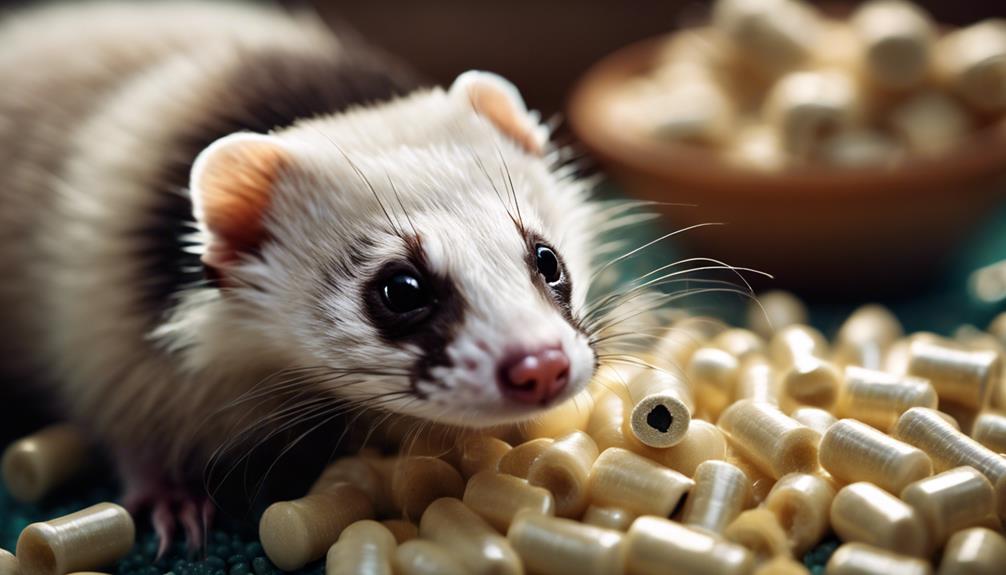When to Use Fiber Supplements for Ferret Digestive Issues

Ferrets are obligate carnivores, meaning their diet should primarily consist of animal-based protein. However, some ferrets may experience digestive issues such as loose stools or constipation. In these cases, it may be beneficial to consider adding fiber supplements to their diet. Fiber can help regulate bowel movements and promote overall digestive health in ferrets. It is important to consult with a veterinarian before introducing any new supplements to your ferret's diet to ensure they are safe and appropriate for your pet's specific needs.
Fiber supplements should not be used as a substitute for a balanced and species-appropriate diet. Instead, they should be seen as a complementary addition to help manage specific digestive issues. Additionally, it is crucial to follow the recommended dosage instructions provided by your veterinarian or the supplement manufacturer to avoid potential side effects or complications. Regular monitoring of your ferret's health and consulting with a veterinarian can help ensure that any dietary modifications are benefiting your pet's well-being.
Common Digestive Issues in Ferrets
Common digestive issues in ferrets often stem from dietary imbalances or changes in their environment. Ferrets have specific nutritional requirements crucial for maintaining digestive health. When these requirements aren't met, issues such as diarrhea, constipation, or gastrointestinal upset may arise. To address these problems, dietary adjustments are essential. Ensuring that ferrets receive a balanced diet rich in protein and low in carbohydrates is key to preventing digestive issues. Additionally, providing a clean and stress-free environment can contribute to their overall well-being and digestive health.
Preventative measures play a vital role in managing common digestive issues in ferrets. Owners should be mindful of the ingredients in their pet's food, opting for high-quality ferret-specific diets to meet their unique nutritional needs. Monitoring their ferret's eating habits and fecal output can also help detect early signs of digestive problems. By promoting a healthy diet and environment, ferret owners can proactively support their pets' digestive well-being.
Benefits of Fiber Supplements

Fiber supplements offer notable benefits for ferrets by promoting improved gut health and aiding in regulating bowel movements.
The addition of fiber can help prevent digestive issues and provide support for overall gastrointestinal function in these small animals.
Improved Gut Health
To enhance overall digestive health, incorporating fiber supplements into a ferret's diet can significantly improve gut function and promote well-being. Fiber benefits the gut microbiota by acting as a prebiotic, supporting the growth of beneficial bacteria in the digestive system.
These beneficial bacteria play a crucial role in maintaining a healthy gut environment, aiding in digestion, nutrient absorption, and immune function. By promoting the growth of these beneficial microbes, fiber supplements help establish a balanced gut microbiota, which is essential for overall gut health in ferrets.
Ensuring a healthy gut microbiota through fiber supplementation can lead to better digestion, reduced risk of gastrointestinal issues, and improved overall well-being for ferrets.
Regulates Bowel Movements
Incorporating fiber supplements into a ferret's diet can help regulate bowel movements, promoting digestive regularity and overall gut health. Fiber plays a crucial role in maintaining proper bowel function by adding bulk to the stool and supporting smooth passage through the digestive tract.
Here are four ways fiber supplements benefit ferrets in regulating their bowel movements:
- Prevents constipation: Fiber helps soften the stool, making it easier to pass and reducing the likelihood of constipation.
- Promotes regularity: By adding bulk to the stool, fiber encourages more consistent and predictable bowel movements.
- Aids in digestion: Fiber assists in moving food through the digestive system efficiently, reducing the risk of gastrointestinal issues.
- Supports overall gut health: A healthy digestive system contributes to the overall well-being of the ferret, ensuring optimal nutrient absorption and waste elimination.
Signs Your Ferret May Need Fiber

Ferret owners should be vigilant for signs that may indicate a need for fiber in their pet's diet. Common indicators of digestive issues include diarrhea, constipation, or irregular bowel movements.
If behavior changes are observed, such as decreased appetite or lethargy, it's advisable to consult a veterinarian promptly.
Digestive Problem Indicators
Observing changes in your ferret's eating habits and stool consistency can provide valuable insight into potential digestive issues that may benefit from additional fiber supplementation. When assessing your ferret for digestive problems, keep an eye out for the following indicators:
- Loss of Appetite: A decreased interest in food could signal digestive discomfort.
- Diarrhea or Constipation: Changes in stool consistency may indicate digestive issues.
- Weight Loss: Unexplained weight loss could be a sign of underlying problems.
- Dehydration: Reduced water intake or signs of dehydration should be addressed promptly.
Regular monitoring of these indicators can help you identify when your ferret may benefit from dietary adjustments or fiber supplements to support their digestive health.
Behavior Changes Observed
Monitoring your ferret's behavior for any changes can provide important clues indicating the need for fiber supplementation to support their digestive health. Behavior changes such as decreased activity levels, lethargy, or changes in playtime interactions could signal underlying digestive issues that may require dietary adjustments.
Additionally, observing alterations in your ferret's litter box habits, such as irregular stool consistency or frequency, could also indicate potential digestive problems. If you notice your ferret exhibiting any of these behavior changes, it may be beneficial to consider incorporating fiber supplements into their diet after consulting with a veterinarian.
Vet Consultation Recommended
To determine if your pet may benefit from fiber supplementation, it's advisable to schedule a consultation with a veterinarian. During the consultation, the vet will assess your ferret's health and digestive issues to determine the best course of action. Signs that may indicate your ferret needs fiber include inconsistent stool quality, frequent diarrhea, or signs of dehydration.
The vet may recommend dietary adjustments, including adding fiber-rich foods or supplements. Additionally, they might suggest incorporating digestive enzymes to aid digestion, probiotics to promote gut health, and ensuring proper hydration levels for overall well-being.
Consulting with a vet is crucial to address any underlying health concerns and develop a tailored plan for your ferret's digestive health.
Types of Fiber Supplements Available

When selecting fiber supplements for ferret digestive issues, it's crucial to consider the various types available to address specific needs efficiently. Fiber sources commonly used in supplements include beet pulp, rice bran, and cellulose.
Beet pulp is highly digestible and helps regulate bowel movements, while rice bran provides soluble fiber for overall gut health. Cellulose, derived from plant sources, adds bulk to the stool, aiding in regularity.
When comparing fiber supplement brands, reviews can provide valuable insights into their effectiveness. Some popular brands include Oxbow Animal Health's Natural Science Digestive Support and Marshall GoodBye Odor Digestive Fiber Supplement. These products have received positive feedback for their ability to improve digestive function in ferrets.
Before choosing a fiber supplement, it's advisable to consult with a veterinarian to determine the most suitable option based on the ferret's specific digestive issues. By selecting the right type of fiber supplement, ferret owners can help promote healthy digestion and prevent gastrointestinal issues in their furry companions.
Dosage Recommendations for Ferrets

To ensure the proper administration of fiber supplements, ferret owners should carefully follow dosage recommendations provided by veterinarians. Maintaining dosage accuracy is crucial in achieving the desired results while preventing potential issues. Monitoring progress is essential to evaluate the effectiveness of the fiber supplement regimen and make any necessary adjustments promptly.
Dosage Recommendations for Ferrets:
- Consultation with Veterinarian: Seek guidance from a veterinarian to determine the appropriate dosage based on the ferret's health condition and specific needs.
- Precision in Measurement: Use precise measuring tools to ensure accurate dosing according to the veterinarian's instructions.
- Regular Monitoring: Keep track of the ferret's response to the fiber supplement, looking for improvements in digestive issues.
- Adjusting Regimen: If there are no improvements or adverse effects, consult the veterinarian for guidance on adjusting the dosage or trying a different supplement to prevent issues and promote digestive health.
How to Administer Fiber Supplements

For proper administration of fiber supplements to ferrets, owners should consider the best methods based on their ferret's individual needs and health conditions. When it comes to fiber supplement application, ferret owners can choose from various options such as mixing the supplement with their ferret's food or administering it directly. Dosing is crucial, and owners should follow the recommendations provided by the supplement manufacturer or their veterinarian.
To ensure the effectiveness of the fiber supplements, monitoring the ferret's response is essential. Owners should observe changes in their ferret's digestive patterns, stool consistency, and overall well-being. Adjustments to the dosage may be necessary based on how the ferret responds to the supplement. Consulting with a veterinarian can also provide valuable guidance on the appropriate dosing and any necessary modifications.
| Application Methods | Dosage | Monitoring Response |
|---|---|---|
| Mix with food | Follow manufacturer's recommendations or vet's advice | Observe changes in digestion and stool |
| Direct administration | Ensure accurate dosing | Monitor overall well-being |
Consulting a Vet for Guidance

Owners seeking optimal care for their ferrets' digestive health should consider consulting a veterinarian for guidance on administering fiber supplements effectively. A vet can provide tailored advice based on the ferret's individual health needs and dietary requirements. Here are some reasons why consulting a vet is crucial:
- Dietary adjustments: Vets can recommend specific dietary changes to complement the use of fiber supplements, ensuring a holistic approach to digestive health.
- Probiotic benefits: Vets can advise on the potential benefits of combining fiber supplements with probiotics to support overall digestive function in ferrets.
- Digestive support: Veterinarians can assess the ferret's current digestive issues and recommend the most suitable fiber supplement to address these specific concerns effectively.
- Professional guidance: Vets have the expertise to monitor the ferret's response to fiber supplements, making adjustments as needed to optimize digestive health.
Frequently Asked Questions
Are There Any Side Effects or Potential Risks Associated With Using Fiber Supplements for Ferrets?
When considering fiber supplement alternatives for ferrets, it's crucial to be aware of potential risks and precautions. While these supplements can aid in digestive issues, side effects such as blockages or imbalances may occur.
Can I Use Human Fiber Supplements for My Ferret, or Do I Need to Specifically Seek Out Supplements Made for Ferrets?
When considering fiber supplements for ferrets, it's crucial to prioritize those formulated specifically for their needs. Human fiber supplements may not be as effective due to dosage variations and fiber types unsuitable for ferret digestion.
How Quickly Can I Expect to See Improvements in My Ferret's Digestive Issues After Starting Them on Fiber Supplements?
Improvements in a ferret's digestive issues after starting fiber supplements can vary. Monitoring progress is crucial. Adjusting dosage as needed is recommended. Tracking changes and evaluating effectiveness over time will help determine the supplement's impact on the ferret's health.
Are There Any Dietary Changes or Restrictions I Should Consider While Incorporating Fiber Supplements Into My Ferret's Diet?
When incorporating fiber supplements into a ferret's diet, it's crucial to consider dietary considerations like reducing sugary treats and ensuring a balanced diet. Feeding schedule adjustments may be needed to optimize the effectiveness of the supplements.
Can Fiber Supplements Be Used as a Long-Term Solution for My Ferret's Digestive Issues, or Are They Meant to Be a Short-Term Fix?
Fiber supplements can provide short term relief for ferret digestive issues by aiding in digestion. However, their long term effectiveness may vary. Consult a veterinarian to determine if ongoing use is suitable for addressing your ferret's specific digestive concerns.











